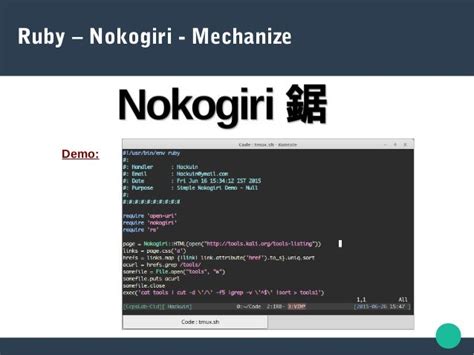In the realm of shell scripting, the usual names come to mind: Bash, Python, and Perl. However, one language that often gets overlooked is Ruby. Despite Ruby’s deep-seated association with the Rails framework, it offers a wealth of features that makes it excellent for scripting tasks, potentially superior to Bash for more complex operations. In this article, we delve into why Ruby deserves more recognition as a shell scripting language and how it stands out from the crowd.
First and foremost, Ruby’s syntax is both elegant and highly readable, making it a joy to work with. Unlike Bash, which can often feel like an arcane series of incantations, Ruby’s syntax is designed to be intuitive and human-friendly. For example, consider a simple task of finding all files in a directory with a given extension. In Bash, you might write something like this:
for file in *.jpg; do
echo "$file"
done
By contrast, the Ruby equivalent is more expressive and concise:
Dir.glob('*.jpg').each { |file| puts file }
When it comes to handling more complex tasks, Ruby shines even brighter. Let’s say you need to parse JSON, make an HTTP request, or manipulate large data structures. Ruby’s rich standard library and its ability to handle exceptions gracefully make it a powerful tool. For instance, using Ruby’s `Net::HTTP` library, you can easily perform HTTP requests. Compare this to Bash, where similar tasks often require mixing in external tools like `curl` or `wget`, resulting in less coherent and more error-prone scripts.
Another significant advantage of Ruby over Bash is the ability to modularize and reuse code effectively. Ruby’s object-oriented nature allows for clean, maintainable code that’s easy to extend. For instance, if you needed to write a script that requires repeatedly performing the same operation on different datasets, you can encapsulate this operation in a Ruby method or a class. Here’s an example:
class DataProcessor
def initialize(data)
@data = data
end
def process
@data.map { |item| item * 2 } # Example transformation
end
end
processor = DataProcessor.new([1, 2, 3])
puts processor.process # Outputs [2, 4, 6]
Comments from experienced developers often highlight one of the most critical aspects of using Ruby for shell scripting: its consistency and robust error handling. Typical shell scripts require constant checking of return values and statuses, often leading to code that’s difficult to debug and maintain. In Ruby, you can leverage exception handling to ensure your script behaves predictably, even when it encounters errors. For example:
begin
File.open('nonexistent_file.txt')
rescue Errno::ENOENT => e
puts "File not found: #{e.message}"
end
This code snippet tries to open a non-existent file and gracefully handles the error, printing a user-friendly message instead of crashing the script.
Despite these advantages, Ruby does face some challenges, primarily its startup time and installation status. Ruby has historically had slower startup times compared to Python or Perl, and it is not always pre-installed on most Linux distributions. However, this is changing. Distributions like Ubuntu now include Ruby by default, and tools like RVM (Ruby Version Manager) make installing and managing Ruby versions straightforward. Moreover, with continued performance improvements, the gap in startup times between Ruby and its competitors is narrowing.
$ sudo apt-get install ruby # Installation on Ubuntu
One of the less often discussed but incredibly powerful features of Ruby is its ability to handle inline dependencies in scripts via Bundler. This capability can significantly simplify script dependencies, allowing you to specify and bundle all required gems in a single file. This is particularly useful in environments where you might not have full control over the system’s package manager. For example:
#!/usr/bin/env ruby
require 'bundler/inline'
gemfile true do
source 'https://rubygems.org'
gem 'httparty'
end
response = HTTParty.get('https://api.example.com/data')
puts response.body
Ruby is not just about Rails, and its potential for shell scripting remains underutilized. By bringing Ruby into your scripting toolkit, you get a powerful language that is not only elegant and readable but also highly capable of handling complex tasks with ease. From its rich standard library to its ability to handle errors gracefully, Ruby offers numerous benefits that make it a strong contender for your next scripting task. So next time you find Bash scripts becoming unwieldy, consider giving Ruby a shot. You might find yourself pleasantly surprised by its capabilities.
The debate over the best language for shell scripting is far from settled, but giving Ruby a closer look is well worth it. Whether you’re a seasoned developer or a hobbyist, exploring Ruby for scripting can open up new ways to craft delightful and maintainable scripts. And with a little practice, you might find Ruby becoming your go-to language for more than just web development.


Leave a Reply